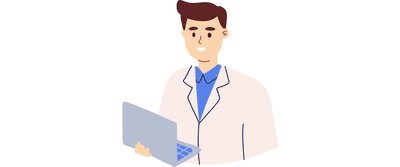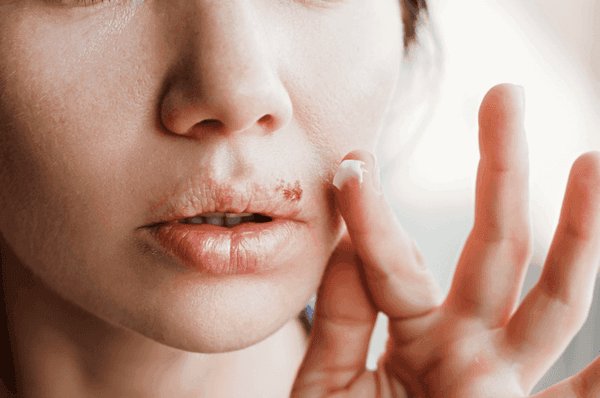![Healthy Matters]() Pharmacist Tips | Dosages | Side effects
Pharmacist Tips | Dosages | Side effects![Healthy Matters]() Nutritionist Tips | Facts | Precautions
Nutritionist Tips | Facts | Precautions![Healthy Matters]() Practitioner Tips | Dosages | Side effects
Practitioner Tips | Dosages | Side effects![Healthy Matters]()
![Healthy Matters]()

Cold Sore: Blisters caused by herpes viruses
4 min read

Cold sores are small blisters that develop on the lips or around the mouth. They are caused by the common and highly contagious herpes simplex virus. You may not experience any symptoms when you first become infected with the virus. Read to learn more about the symptoms, causes, risk factors and treatment of cold sores.
Cold sore meaning: What is it?
Cold sores are small and fluid-filled blisters that commonly develop around the lips, mouth and nose. They are caused by herpes simplex virus which is highly contagious and can be spread by kissing or sharing utensils or towels. You may not have any symptoms when you first become infected with the virus, until an outbreak of cold sores happens sometime later. If you suddenly develop a tingling, itching or burning sensation around your mouth or face, it could be an early sign of cold sores.
Cold sore symptoms
Cold sores are caused by the infection of herpes simplex virus, some may not experience any symptoms when they first become infected with the virus. However, if you do develop cold sores, symptoms may include:
- Tingling, burning or itching sensation around the lips, before the cold sore develops
- Reddening and swelling of the area as the blisters form
- Rupture of the blisters and ooze clear or yellow discharge
- Crusting of the open sore which may crack or bleed as it heals
- Scabs will fall off and usually takes 1-2 weeks for the cold sore to heal completely
If the primary infection of herpes simplex virus does cause symptoms, they can be more severe than the cold sores, which include:
- High temperature (fever)
- Sore throat and swollen glands
- Swollen gums with small, painful sores in the mouth (Herpes simplex gingivostomatitis)
- Nausea
- Headaches
- Bad breath (halitosis)
Cold sore causes
Cold sores are caused by the herpes simplex virus. There are two types of the herpes simplex virus. Herpes simplex virus type 1 (HSV-1) usually causes cold sore and herpes simplex virus type 2 (HSV-2) usually causes genital herpes with painful blisters on the genital area. Occasionally, cold sores can also be caused by HSV-2.
In most cases, the virus is passed on in early childhood such as when a child is kissed by a family member with a cold sore. After being infected by HSV-1, the virus never goes away and it can pass through the skin and remain dormant (inactive) in a group of nerve cells in the face. When the virus is triggered, it activates and travels through the nerve to the face and develops into a cold sore.
Cold sore risk factors and triggers
In many cases, there’s no obvious trigger for an outbreak of cold sores. Factors thought to trigger activation of HSV-1 include:
- Having another infection (such as a common cold or chest infection)
- Emotional or physical stress
- Tiredness and fatigue
- Injury to the affected area
- Hormonal changes (such as menstruation period)
- Strong sunlight
Cold sore diagnosis
Cold sores are often diagnosed based on the presenting history and clinical examination of the lesions. If the diagnosis is unclear, doctors may swab the sore and send it to the laboratory for examination under the microscope to identify the pathogens.
Cold sore treatment
Cold sores will usually clear up within 7-10 days without any treatment. Cold sore cream or antiviral tablets can be used to alleviate the symptoms and speed up the healing time. However, the treatment does not get rid of the herpes simplex virus or prevent future outbreaks of cold sores from occurring.
Medical management of cold sores includes:
- Painkillers - simple analgesia such as ibuprofen or paracetamol can help to ease any pain or irritation caused by the cold sores
- Cold sore cream and tablets - Antiviral cream (such as acyclovir or penciclovir) can be used in the early stage when a cold sore appears, to stop the herpes simplex virus from spreading and replicating. In more severe cases, antiviral tablets are available to provide more effective treatment for the herpes simplex virus.
General advice on cold sores management includes:
- Wash your hands with soap and water before and after applying cold sore cream
- Dab cold sore cream onto sores rather than rubbing them in
- Avoid touching the cold sore or picking the scab, to avoid secondary infection or scarring
- Do not share the cold cream with others
- Use an antiseptic mouthwash if it is painful brushing your teeth
Cold sore complications
Cold sores are an annoying problem, but they get better without any specific treatment in most people. However, in people with suppressed immune systems (such as undergoing chemotherapy, taking high doses of corticosteroids or having human immunodeficiency virus - HIV), the cold sores can spread more widely and symptoms can be more severe.
Uncommon but serious complications of cold sore that require medical attention include:
- Inflammation of the brain (encephalitis) - The virus spread to the brain leading to inflammation of the brain which can be life-threatening
- Infection of the eye (herpetic keratoconjunctivitis) - The virus spread to the eye leading to the painful red eye which can cause an ulcer on the cornea and potentially damage sight
Cold sore preventions
Since cold sores are spread through direct physical contact, the best method of prevention is to avoid physical contact with a person’s sores when they have an outbreak. Things you can do to prevent getting herpes simplex virus include:
- Avoid sharing utensils, towels or other items that a person with a cold sore may have used
- Avoid coming into contact with infected body fluids, such as kissing an infected person
After being infected with herpes simplex virus, there is no sure way to prevent more cold sores, but there are things you can do to prevent the outbreaks and spreading of the virus.
- Identify and avoid the things that trigger the cold sores, such as stress or direct sunlight exposure
- Avoid sharing towels, toothbrushes or other items with a person who has a cold sore
- Consult your doctor if you get cold sores often. Antiviral medication may be useful to prevent cold sore outbreaks on an individual basis
Having cold sores does not necessarily mean you have an STD. Most of the cold sores are caused by the herpes simplex virus 1 (HSV-1), which is generally transmitted through direct and physical contact, less so but could still potentially be transmitted through sexual contact. Though less commonly, cold sores may be caused by another type of herpes simplex virus 2 (HSV-2), a strain of herpes simplex virus that is most commonly associated with genital herpes and is almost exclusively transmitted through sex or other direct genital contacts.
Factors that can trigger an outbreak of cold sores include having another infection such as a common cold or chest infection, emotional or physical stress, exposure to strong sunlight, hormonal changes such as menstruation period and injury to the affected area.
The exact time it takes for a cold sore to heal varies between individuals. Most cold sores will get better within 7 - 10 days without any treatment.
This article was independently written by Healthy Matters and is not sponsored. It is informative only and not intended to be a substitute for professional medical advice, diagnosis or treatment. It should not be relied upon for specific medical advice.

Your health resource, made in Hong Kong
Healthy Matters is Hong Kong’s leading health resource. Our mission is to help you make better health decisions and take control of your health.
Our team of experts is committed to producing reliable health content that is accurate, engaging and relevant, to cover your health & wellness journey from prevention to treatment.
Whether you are looking for trusted information on health conditions, wellbeing or looking for the right doctor or service in Hong Kong, we’re here to help!
Your health matters. Begin your health journey with Healthy Matters today!































